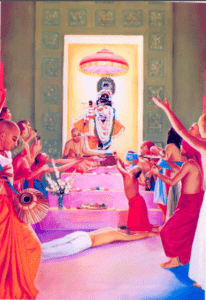According to Srimad Bhagavatam (11.21.2), the practice of chanting the holy name must be done in this way:
sve sve ‘dhikare ya nistha
sa gunah parikirtitah
viparyayas tu dosah syad
ubhayor esa niscayah (33)
Stability in one’s position is considered true devotion, while deviating from one’s position is considered unholy. Thus, the two things are definitively established.
Qualifications for chanting the holy name are given in Srimad Bhagavatam (11.20. 27-8):
jata-sraddho mat-kathasu
nirvinnah sarva-karmasu
veda duhkhatmakan kaman
parityage ‘py anisvarah
tato bhajeta mam pritah
sraddhalur drdha-niscayah
jusamanas ca tan kaman
duhkhodarkams ca garhayan (34)
Having awakened faith in the tales of My glories, disgusted by material activities, knowing that sense gratification leads to misery, even if he is unable to give up all sense gratification, My devotee remains happy and worships Me with great faith and conviction. Even though he sometimes engages in sense gratification, My devotee knows that it leads to an unfortunate outcome and sincerely regrets doing those things.
The acquisition of the six favorable qualities for the performance of bhajana is important. These are described in Upadesamrta (3):
utsahan niscayad dhairyat
tat-tat-karma-pravartanat
sanga-tyagat sato vrtteh
sadbhir bhaktih prasidhyati (35)
There are six principles conducive to performing pure devotional service: (1) to be enthusiastic, (2) to strive with confidence, (3) to be patient, (4) to act according to regulatory principles (such as sravanam kirtanam visnoh smaranam – listening, chanting, and remembering Krishna), (5) abandoning the association of non-devotees, and (6) following the steps of the previous acaryas. These six principles undoubtedly ensure complete success in pure devotional service.”
This is a section of the book “Bhajana Rahasya”, by Bhaktivinode Thakura.
To buy the complete book, click above
Post view 373 times




Leave a Reply